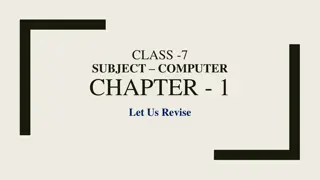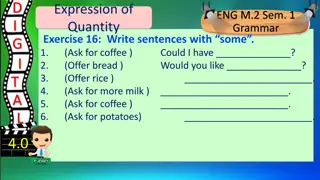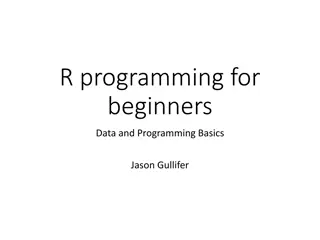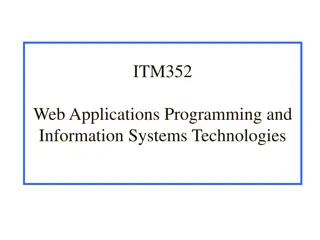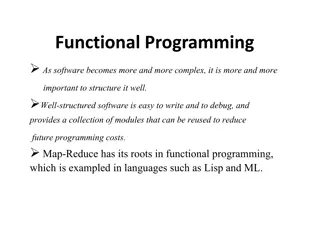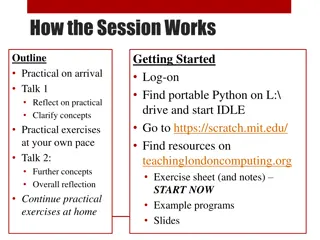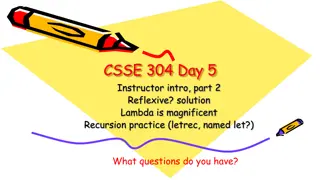Enhancing Programming Skills Through Practical Exercises
Explore the practical aspects of software engineering education with a focus on implementing loops, removing duplicates, calculating squares, and sorting numbers in a programming course. The exercises emphasize hands-on experience and problem-solving skills essential for aspiring software developers.
Download Presentation

Please find below an Image/Link to download the presentation.
The content on the website is provided AS IS for your information and personal use only. It may not be sold, licensed, or shared on other websites without obtaining consent from the author.If you encounter any issues during the download, it is possible that the publisher has removed the file from their server.
You are allowed to download the files provided on this website for personal or commercial use, subject to the condition that they are used lawfully. All files are the property of their respective owners.
The content on the website is provided AS IS for your information and personal use only. It may not be sold, licensed, or shared on other websites without obtaining consent from the author.
E N D
Presentation Transcript
Experience vs. Practice in SE Education Dror Feitelson Hebrew University
SCENE ONE SCENE ONE
Ex3 in some programming course Subject: loops Input: read a list of numbers End with EOF Skip inputs that are not numbers Processing: Remove duplicates Calculate square of each one Sort them Output: print list of squares Exact format for automatic testing
Ex3 in some programming course Subject: loops Input: read a list of numbers End with EOF Skip inputs that are not numbers Processing: Remove duplicates Calculate square of each one Sort them Output: print list of squares Exact format for automatic testing loop end irrelevant
Ex3 in some programming course Subject: loops Input: read a list of numbers End with EOF Skip inputs that are not numbers Processing: Remove duplicates Calculate square of each one Sort them Output: print list of squares Exact format for automatic testing foreach loop nested loops
Ex3 in some programming course Subject: loops Input: read a list of numbers End with EOF Skip inputs that are not numbers Processing: Remove duplicates Calculate square of each one Sort them Output: print list of squares Exact format for automatic testing Can combine sorting with duplicate removal
Ex3 in some programming course Subject: loops Input: read a list of numbers End with EOF Skip inputs that are not numbers Processing: Remove duplicates Calculate square of each one Sort them Output: print list of squares Exact format for automatic testing nuisance
Ex3 in some programming course Subject: loops Input: read a list of numbers End with EOF Skip inputs that are not numbers Processing: Remove duplicates Calculate square of each one Sort them Output: print list of squares Exact format for automatic testing missing: loop invariants loop variants
Ex3 in some programming course Subject: loops Input: read a list of numbers End with EOF Skip inputs that are not numbers Processing: Remove duplicates Calculate square of each one Sort them Output: print list of squares Exact format for automatic testing
SCENE TWO SCENE TWO
The value of experience Experienced developers are often more effective Faster, work on autopilot Use tools appropriate for the task Produce better results Experienced developers think differently Higher level of abstraction Deeper understanding of the system as a whole
Soloway & Ehrlich 1984 Experiments on differences between students and industrial professionals Professionals know and use design patterns Professionals know and use programming conventions If patterns and conventions are violated, professionals are not much better than students
Arisholm et al. 2004 Experiment on maintenance of coffee machine software Centralized style: front panel basically does everything (not good OOD) Delegated: front panel just activates other modules (better OOD) Students did better on centralized style Inexperienced subjects had trouble with delegated style
Arisholm et al. 2004 Experiment on maintenance of coffee machine software Centralized style: front panel basically does everything (not good OOD) Delegated: front panel just activates other modules (better OOD) Students did better on centralized style Inexperienced subjects had trouble with delegated style How is effective experience built?
SCENE THREE SCENE THREE
Benjamin Franklin Author, printer, political theorist, politician, freemason, postmaster, scientist, inventor, civic activist, statesman, and diplomat Founding father: signer of both the Declaration of Independence and the Constitution
Benjamin Franklin Author, printer, political theorist, politician, freemason, postmaster, scientist, inventor, civic activist, statesman, and diplomat Founding father: signer of both the Declaration of Independence and the Constitution On $100 bills since 1928
Benjamin Franklin Author, printer, political theorist, politician, freemason, postmaster, scientist, inventor, civic activist, statesman, and diplomat Founding father: signer of both the Declaration of Independence and the Constitution On $100 bills since 1928 How did he learn to write well?
Pages 105-108 Based on Franklin s autobiography
1. Obtain examples of clearly superior prose (the spectator periodical) 2. Read articles and make notes of the meaning of each sentence 3. A few days later, express these meanings in his own words 4. Compare with original to see how it could be done better 5. Rewrite whole essays in verse, to improve vocabulary (rhyming requires ability to express a thought in different ways to fit)
6. Later convert back to prose and compare with original 7. Write a note on each sentence on a separate slip of paper and mix them 8. Weeks later, try to put them back in correct order and compare with original 9. Did this workdays before and after work (as a printer) and on Sundays 10. Didn t write essays to practice
whatdowe knowabout ?
Simon & Chase 1973 Chess Masters have a vocabulary of meaningful positions See patterns of attack or defense, not individual pieces Can recognize and reconstruct game boards at a glance Achieving mastery takes 10 years of hard work Even Bobby Fischer needed 9
Ericsson et al. 1993 Deliberate practice World-class musicians and other performing artists Champion athletes and sports teams Army fighter pilots and civil pilots Medical doctors and X-ray analysts And more
Deliberate practice Designed specifically to improve performance on a well-defined activity More practice is waste of time Comfort zone Effective improvement Learning zone Ineffective Panic zone Attributed to Noel Tichy
Deliberate practice Designed specifically to improve performance on a well-defined activity Typically by a knowledgeable teacher Just beyond your current ability Repeated a lot Focus exclusively on the important part With immediate feedback Need to know how well you did to improve Not fun Challenge yourself to conquer new ground Most people don t have the required self discipline
Deliberate practice Designed specifically to improve performance on a well-defined activity Typically by a knowledgeable teacher Just beyond your current ability Repeated a lot Focus exclusively on the important part With immediate feedback Need to know how well you did to improve Not fun Challenge yourself to conquer new ground Most people don t have the required self discipline
Experience expertise performance more experience time
10 years Need deliberate practice of 10000 hours Over 10 years That s 1000 hours a year That s about 3 hours a day, every day Deliberate practice requires intense concentration Can t be done a whole day, but some should be done every day
Pilots have simulators to practice turns and landings over and over again safely and inexpensively ?
Reading before writing Glass / Facts and Fallacies of Software Engineering, 2003 Fallacy #10: You teach people how to program by showing them how to write programs More important to read great programs written by others Just like learning any other foreign language Especially in the age of maintenance
Personal software process Watts Humphrey / Introduction to the Personal Software Process, 1997 Practice time management from the start Meticulously record all activities performed Analyze time investment Learn to predict realistic schedules Practice bug tracking from the start Meticulously record all bugs and fixes Learn to assess and predict quality
Agile development Constant feedback from peers Peer review of code before each commit Constant feedback from client Potentially shippable increment of working software every few weeks Client decides whether to accept it New requirements emerge from experience with use Reflection on process Sprint retrospective in Scrum
The new Ex3 Write 100 loops for different situations For each one show it terminates using a loop variant For each one identify a loop invariant Estimate the number of iterations as a function of the input Write 100 recursive functions for different situations Show why each one must eventually terminate Estimate the number of calls as a function of the input
Learning la Franklin Use well-known open source libraries to practice interface definition Given general spec, define the interface and contract for each function Compare with that of the original library Given the functions, write the documentation for each one Compare with that of the original library (is yours perhaps better?) Don t really implement any of it
Learning la Franklin Use well-known open source projects to practice modularity and design Given general spec, define the modules and main interactions between them Compare with that of the original project s decomposition Given the architecture, define the methods for each class Compare with those of the original project Don t really implement any of it
Learning la Franklin Practice exception handling Given library functions, define contracts Focus on preconditions (and throwing exceptions) vs. handling problematic inputs Compare with that of the original library/project Example: List::get() Option 1: if list is empty return null reference Option 2: if list is empty throw an exception Discuss implications in 100 such cases
The agenda Identify problem spot What we are generally bad at Devise deliberate practice plan Many focused practice examples Method for evaluation and feedback Evaluate in practice Implement in a course Repeat
Any questions? Any volunteers?




